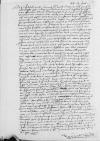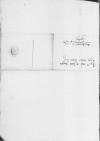List #641
Mark LAURIJN do Ioannes DANTISCUSBruges, 1531-06-12
| odebrano Ghent (Gandavum), [1531]-06-14 Rękopiśmienne podstawy źródłowe:
Publikacje:
| ||||||||||||
Tekst + aparat krytyczny + komentarz Zwykły tekst Tekst + komentarz Tekst + aparat krytyczny Ekscerpty dotyczące podróży Dantyszka
Reverendissimo Domino, Domino
Salutem plurimam.
Reddidit mihi
Progrediendo me diffidentiae arguis, quod domini
Continuando tanta elegantia, tanta verborum congerie tuos aperis erga me affectus tua opera, etiam in omnibus ultro oblata, idque non tam eandem implorando, quam praescribendo. Ubi haec sum promeritus? Quid hic faciam? Ita duplicibus in me retortis iaculis, laude videlicet primum, dein officio me feriisti, ut, quid ipse referam, ingenue fatear me non habere. Ubi nunc non ubique se protrudit verecundia? At consolatur me, quod ea talis sit, quae venerationis loco magis habeatur temeritatem excludens, quam diffidentiae desperationem inducens, itaque reprehensione vacans ferenda potius, quam damnanda.
Ceterum munus mihi a Tua Reverendissima Paternitate iniunctum exsecutus sum. Tuo nomine domini
Praeterea, ne ipse mihi desim et partes meas neglegere videar, habet
Cum ultimam manum his apponere statueram litteris, miserat
Interim bene valeat Tua Reverendissima Paternitas.
Tuae Paternitati Reverendissimae obsequentissimus
[1 ] The so called Hof van Beveren (Beveren Mansion) in Brugge, which originally belonged to Anthony of Burgundy, lord of Beveren, in the 16th century came into the possession of the Laurijn family. It was the residence of Mark Laurijn and his sister-in-law Elisabeth Donche

